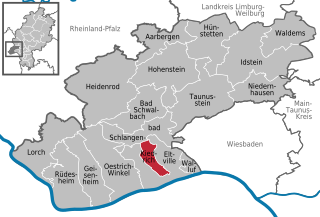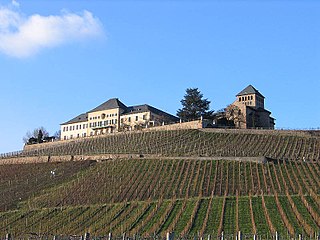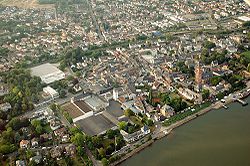Rheingau-Taunus is a Kreis (district) in the west of Hesse, Germany. Rheingau-Taunus-Kreis is part of the Darmstadt region; its main administrative seat is Bad Schwalbach. Outposted sections of the local administration are located in Idstein and Rüdesheim am Rhein.
Heidesheim am Rhein is an Ortsbezirk (borough) of the town Ingelheim am Rhein in the Mainz-Bingen district in Rhineland-Palatinate, Germany. Before July 2019, it was a separate municipality belonging to the former Verbandsgemeinde Heidesheim am Rhein, of which it was the administrative seat. Heidesheim was one of the biggest municipalities in Rhenish Hesse.

Bingen am Rhein is a town in the Mainz-Bingen district in Rhineland-Palatinate, Germany.

Rüdesheim am Rhein is a German winemaking town in the Rhine Gorge, and part of the UNESCO World Heritage Site in this region. It lies in the Rheingau-Taunus-Kreis district in the Regierungsbezirk of Darmstadt, Hessen. Known as Rüdesheim, it is officially Rüdesheim am Rhein, to distinguish it from Rüdesheim an der Nahe. It is a major tourist attraction, especially for foreign visitors.

The Rheingau is a region on the northern side of the Rhine between the German towns of Wiesbaden and Lorch near Frankfurt, reaching from the Western Taunus to the Rhine. It is situated in the German state of Hesse and is part of the Rheingau-Taunus-Kreis administrative district. It is famous for Rheingau wines, especially the "Rheingauer Riesling," and its many taverns.

Niedernhausen im Taunus is a municipality in the Rheingau-Taunus-Kreis in the Regierungsbezirk of Darmstadt in Hesse, Germany, with almost 15,000 inhabitants.

Eberbach Abbey is a former Cistercian monastery in Eltville in the Rheingau, Germany. On account of its Romanesque and early Gothic buildings it is considered one of the most significant architectural heritage sites in Hesse.

Oestrich-Winkel is a town with roughly 12,000 inhabitants in the Rheingau-Taunus-Kreis in the Regierungsbezirk of Darmstadt in Hesse, Germany.

Frauenstein is the westernmost borough of the city of Wiesbaden, located in the Rhine Main Area near Frankfurt and capital of the federal state of Hesse, Germany. The borough has a population of approximately 2,400. The formerly independent village was incorporated into Wiesbaden in 1928.

Kiedrich is a municipality in the Rheingau-Taunus-Kreis in the Regierungsbezirk of Darmstadt in Hesse, Germany.

Walluf is a municipality in the Rheingau-Taunus-Kreis in the Regierungsbezirk of Darmstadt in Hesse, Germany. With 5,581 residents in its 6.74 square kilometer area, it is the most densely populated community in the Rheingau-Taunus-Kreis.
The Königssondergau was a Frankish gau (district) which existed in the area north of the confluence of the Rhine and Main rivers in Germany, from Frankish times until the end of the 12th century. Often mistakenly equated with the Rheingau, the Gau was based around the former Roman administrative district of Civitas Mattiacorum. The name Kunigessuntera is documented the first time in 819. A main court (fiscus) with senior officials were present in Wiesbaden; sub-courts existed in Biebrich and Mosbach.

Rheingau is one of 13 designated German wine regions (Weinbaugebiete) producing quality wines . It was named after the traditional region of Rheingau, the wine region is situated in the state of Hesse, where it constitutes part of the Rheingau-Taunus-Kreis administrative district. Although, making up only 3 percent of the total German vineyard area, Rheingau has been the source of many historically important innovations in German wine making, and contains many wine producers of international reputation, such as Schloss Johannisberg. Rheingau, with 3,125 hectares of vineyards in 2016, also boasts a higher proportion of Riesling (77.7%) than any other German wine-growing region, with Spätburgunder making up most of the rest (12.2%), followed by Müller-Thurgau.

Princess Marianne of the Netherlands, Princess of Orange-Nassau was the youngest child of King William I of the Netherlands and Princess Wilhelmine of Prussia.

Schierstein is a southwestern borough of Wiesbaden, capital of state of Hesse, Germany. First mentioned in historical records in 860, Schierstein was incorporated into Wiesbaden in 1926. Today the borough has about 10,000 residents. Situated on the Rhine River, Schierstein is known as the "Gateway to the Rheingau."

Hattenheim is a Stadtteil in Eltville am Rhein, Hesse, Germany. It lies within the Rheingau wine region.

Erbach is a Stadtteil in Eltville am Rhein, Hesse, Germany. It lies within the Rheingau wine region.

Eltville station is the railway station of Eltville in the Rheingau in the German state of Hesse, on the East Rhine Railway from Wiesbaden to Koblenz. It is classified by Deutsche Bahn as a category 5 station.

Rauenthal is a town in the Rheingau, in the Rheingau-Taunus-Kreis, Hesse, Germany. It became part of Eltville in 1977, then officially name Rauenthal (Rheingau). It is known for growing wine.

Eltville Castle is an urban castle in Eltville am Rhein im the Hessian county of Rheingau-Taunus and is the symbol of the town. In German the castle is also known as the Kurfürstliche Burg.




































